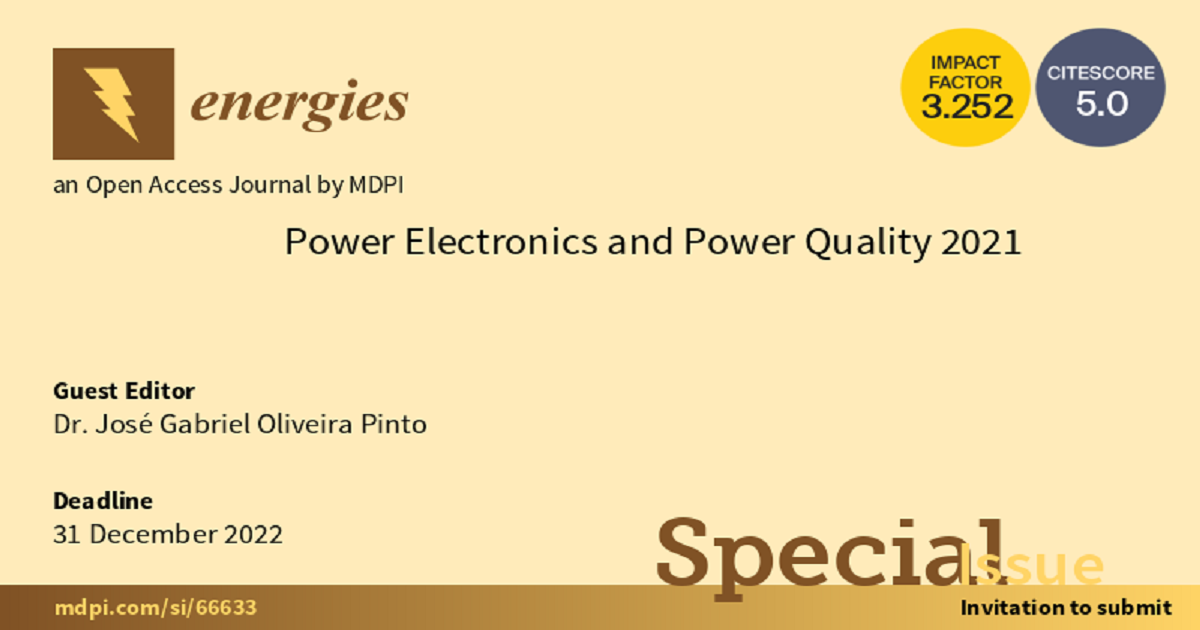Power Electronics and Power Quality 2021
A special issue of Energies (ISSN 1996-1073). This special issue belongs to the section "F3: Power Electronics".
Deadline for manuscript submissions: closed (31 December 2022) | Viewed by 26677

Special Issue Editor
Interests: power electronics; power quality; active power conditioners; renewable energy systems; electric vehicles; digital control of power electronics converters
Special Issues, Collections and Topics in MDPI journals
Special Issue Information
Dear Colleagues,
Nowadays, with distributed generation, the integration of intermittent renewable energy sources, the widespread use of electric vehicles and charging infrastructure, and the electrification of railways, a set of new challenges are arising for electric power systems, namely in terms of stability and power quality. Therefore, the research and development of solutions for monitoring and improving power quality is more important than ever. This Special Issue of Energies aims to collect and disseminate the latest advances in power electronics and power quality, namely in terms of power quality monitoring, active power conditioners for power quality improvement, power quality in smart grids and microgrids, energy storage systems with power quality ancillary services, electric vehicle battery chargers with smart operation modes, and the integration of renewable energy systems with power quality ancillary services.
Dr. José Gabriel Oliveira Pinto
Guest Editor
Manuscript Submission Information
Manuscripts should be submitted online at www.mdpi.com by registering and logging in to this website. Once you are registered, click here to go to the submission form. Manuscripts can be submitted until the deadline. All submissions that pass pre-check are peer-reviewed. Accepted papers will be published continuously in the journal (as soon as accepted) and will be listed together on the special issue website. Research articles, review articles as well as short communications are invited. For planned papers, a title and short abstract (about 250 words) can be sent to the Editorial Office for assessment.
Submitted manuscripts should not have been published previously, nor be under consideration for publication elsewhere (except conference proceedings papers). All manuscripts are thoroughly refereed through a single-blind peer-review process. A guide for authors and other relevant information for submission of manuscripts is available on the Instructions for Authors page. Energies is an international peer-reviewed open access semimonthly journal published by MDPI.
Please visit the Instructions for Authors page before submitting a manuscript. The Article Processing Charge (APC) for publication in this open access journal is 2600 CHF (Swiss Francs). Submitted papers should be well formatted and use good English. Authors may use MDPI's English editing service prior to publication or during author revisions.
Keywords
- power electronics
- power quality
- power quality monitoring
- power quality improvement
- power quality conditioners
- control theories
- smart grids
- microgrids
- energy storage systems
- distributed generation
- renewable energy systems
- electric vehicles
Benefits of Publishing in a Special Issue
- Ease of navigation: Grouping papers by topic helps scholars navigate broad scope journals more efficiently.
- Greater discoverability: Special Issues support the reach and impact of scientific research. Articles in Special Issues are more discoverable and cited more frequently.
- Expansion of research network: Special Issues facilitate connections among authors, fostering scientific collaborations.
- External promotion: Articles in Special Issues are often promoted through the journal's social media, increasing their visibility.
- Reprint: MDPI Books provides the opportunity to republish successful Special Issues in book format, both online and in print.
Further information on MDPI's Special Issue policies can be found here.
Related Special Issues
- Power Electronics and Power Quality 2019 in Energies (11 articles)
- Power Electronics and Power Quality in Energies (17 articles)
- Power Electronics and Power Quality 2024 in Energies (6 articles)





